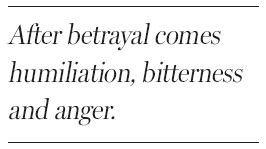When trust is broken
Updated: 2013-10-13 08:24
(The New York Times)
|
|||||||
You may have heard that love makes the world go round. But more likely, it's trust.
In our private lives, we trust that our friends and spouses are who they say they are. In the public realm, we trust schools to keep children safe, drivers to stop at red lights. We trust politicians to act on our behalf, civil servants to run our cities and governments to carry out their roles as the working heart of societies.
But what happens when trust is broken?
As a psychiatrist at Weill Cornell Medical School in New York, Anna Fels has seen the fallout while treating patients "who had suddenly discovered that their life, as they knew it, was based on a long-term falsehood," she wrote in The Times. "They were people who might have stumbled across family secrets on the Internet or found old bills from a spouse's long-hidden liaisons."
In the crises that follow, she wrote, it is the betrayed, not the betrayer, who has the tougher time. "The emotions they feel, while seemingly more benign than those of the perpetrator, may in the long run be more corrosive: humiliation, embarrassment, a sense of having been naive or blind, alienation from those who knew the truth all along and, worst of all, bitterness."

Much of the American public may be feeling this. First, there are the reports of personal data gathering and the invasion of privacy conducted by both government and business. Most recently, The Times reported that the National Security Agency was creating "sophisticated graphs of some Americans' social connections that can identify their associates, their locations at certain times, their traveling companions and other personal information."
James Risen, a Times reporter, and Laura Poitras, the filmmaker who recorded Edward Snowden's statement on his release of secret N.S.A. data, wrote: "Almost everything about the agency's operations is hidden, and the decision to revise the limits concerning Americans was made in secret, without review by the nation's intelligence court or any public debate."

But secrecy is not the only problem. Americans who may have been struggling with their mistrust of government woke on October 1 to find that there was much less government to mistrust: the budget fight between Democrats and Republicans had led to a partial government shutdown. The crisis froze many services, including for the needy, closed national parks and initially furloughed 800,000 federal employees.
How do Americans feel? A Pew research poll conducted as the shutdown approached found that public anger at the government was higher than at any point since 1997, when the group began asking the question of voters: 26 percent were "angry," while 51 percent were "frustrated." Among groups surveyed, conservative Republicans rated highest on the anger scale - 41 percent - but the nation's youngest voters had largely sidestepped the frustration, by ignoring everything. Among those younger than 30, 63 percent were not following the news closely, and nearly half said they weren't following it at all.
One Times reader felt that was precisely the problem: It is not the government's mistakes, "no matter how often they're repeated, that make people distrust it," he wrote. "It's our distrust of our fellow citizens that we see reflected in our negative attitudes about the government."
PETER CATAPANO
(China Daily 10/13/2013 page9)